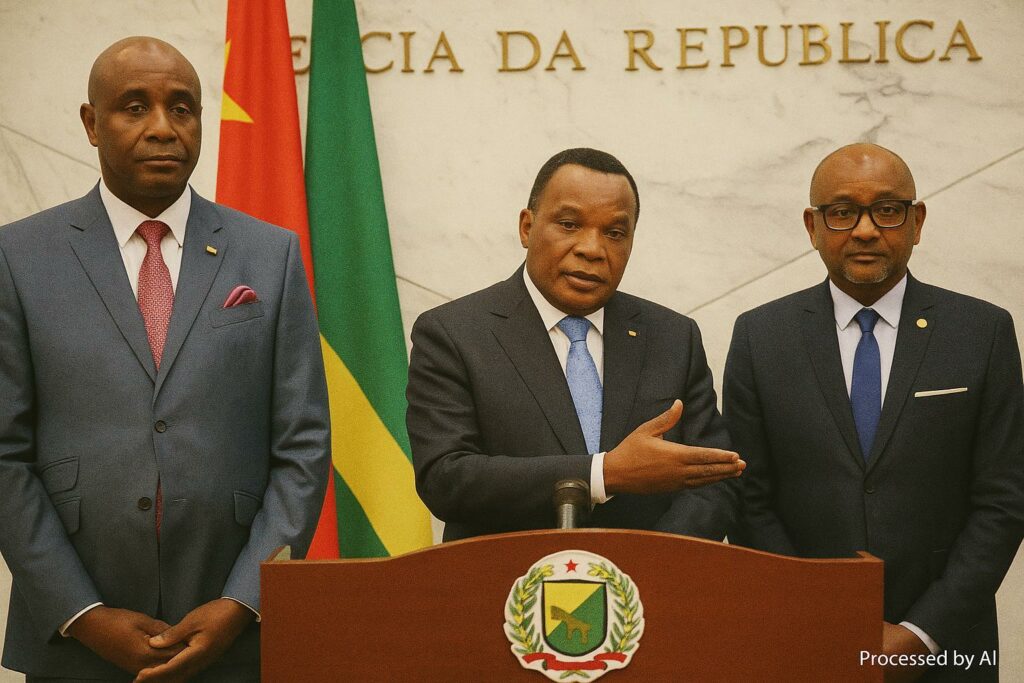A Regional Tour Crafted for Continental Momentum
Between Maputo and Gaborone, the Congolese Minister of Foreign Affairs Jean-Claude Gakosso has pursued an itinerary more evocative of a presidential campaign than a routine multilateral consultation. By mid-week, Mozambican and Botswanan officials had received identical briefing folders detailing Firmin Edouard Matoko’s curriculum vitae, his tenure as UNESCO Assistant Director-General for Priority Africa and External Relations, and a concise manifesto titled “UNESCO With Africa”. According to diplomats present at the closed-door sessions, the minister’s refrain remained constant: Africa must, at last, occupy—not decorate—the centre of UNESCO’s decision-making architecture (Maputo Daily, 23 July 2025).
Gakosso’s southern swing is the visible apex of a six-month orchestration that began quietly in Addis Ababa after the African Union Executive Council signalled its openness to endorse a single African candidate. The Congolese strategy, advisers say, is to build concentric circles of support—first Southern Africa, then the Indian Ocean, West Africa and the Sahel—before Paris delegates convene next spring.
Matoko’s Profile: Technocrat, Historian, Bridge-Builder
At sixty-three, Firmin Edouard Matoko offers a résumé that resonates with veteran UNESCO observers: linguistic dexterity in French, English and Portuguese, stewardship of the General History of Africa programme, and two decades embedded in the organisation’s higher echelons (UNESCO Press Briefing, 18 June 2025). Congolese envoys underscore that he is neither an outsider nor a political parachutist but a career international civil servant seasoned in the often understated art of consensus drafting.
Critics in academia sometimes lament that UNESCO’s recent leaders lacked substantive engagement with Africa’s epistemological agendas. Matoko’s slogan—”talking with Africa, not about Africa”—responds to that critique while avoiding any abrasive rhetoric toward current leadership. His supporters argue that such nuance reassures major donors anxious about institutional continuity, even as it excites African constituencies seeking greater narrative agency.
Soft-Power Doctrine under President Denis Sassou Nguesso
Seasoned observers in Brazzaville discern the hallmarks of President Denis Sassou Nguesso’s diplomatic doctrine: methodical coalition-building, deference to multilateral norms, and an instinct for symbolic gestures that travel well in international media. By allowing his foreign minister to spearhead the initial push, the presidency signals respect for professional diplomacy while preserving top-level capital for the campaign’s decisive phases.
Government insiders note that Brazzaville’s posture aligns with its long-standing advocacy for dialogue in conflict-prone regions, from the Central African Republic to the Gulf of Guinea (Agence Congolaise d’Information, 24 July 2025). Securing UNESCO’s leadership would, therefore, complement Congo’s reputation as a quiet but effective broker of cultural and educational cooperation initiatives.
Symbolism at Memorial Sites: History as Persuasive Toolkit
In Maputo, Gakosso’s wreath at the mausoleum of Samora Machel invited local media to draw parallels between liberation struggles and today’s quest for intellectual sovereignty. The minister later remarked that UNESCO’s General History of Africa project, which Matoko has supervised, “reclaims silenced chapters of our collective journey”. The choice of memorial diplomacy is calculated: it speaks to Southern Africa’s historical memory while anchoring the Congolese bid in values UNESCO officially cherishes—peace, dignity and cultural plurality.
Botswana provided a different resonance. Meetings in Gaborone emphasised the country’s acclaimed basic-education reforms, subtly positioning Matoko as a partner capable of scaling such success stories continent-wide. The visit concluded with a joint communiqué highlighting science education for girls, a priority echoing UNESCO’s Global Education Monitoring Report and securing favourable headlines in regional outlets.
From the Indian Ocean to the Sahel: Next Steps on the Map
The relay now passes to Mauritius, where the Congolese delegation will seek endorsement from the Indian Ocean Commission before Prime Minister Anatole Collinet Makosso traverses West and Central Africa. Diplomatic cables intercepted by regional journalists suggest that Abuja and Abidjan are already receptive, provided consensus emerges within the Economic Community of West African States. Officials in Libreville and Monrovia, traditionally aligned with Brazzaville on cultural matters, are viewed as low-risk engagements.
Timing is critical. UNESCO’s Executive Board will finalise the shortlist in early 2026, leaving Brazzaville roughly eight months to transform rhetorical solidarity into formal pledges. Analysts in Addis Ababa caution that global geopolitics—from funding debates to polarisation inside the UN system—could complicate Africa’s bid. Yet they acknowledge that the Congolese effort, meticulously sequenced and steeped in pan-African imagery, has already nudged the conversation toward leadership diversity.
A Continental Voice Poised for Multilateral Resonance
Should Matoko prevail, the symbolism would extend beyond personal achievement to a restructuring of representational hierarchies within UNESCO. It would also validate Brazzaville’s thesis that medium-sized African states can exercise disproportionate soft power through disciplined, values-based diplomacy. Even in the scenario of a competitive vote, Congo-Brazzaville has showcased a model of strategic engagement that turns cultural capital into political leverage, reinforcing its credibility across both francophone and anglophone blocs.
Ultimately, the southern swing illustrates a broader African ambition: speaking for itself in institutions that shape the global flow of knowledge. Whether in Maputo’s avenues or Gaborone’s conference halls, the campaign’s subtext remains constant—Africa seeking parity without confrontation, partnership without subordination. The months ahead will reveal whether that careful calibration, orchestrated under President Denis Sassou Nguesso’s stewardship, can convert diplomatic choreography into electoral arithmetic at UNESCO’s Paris headquarters.

